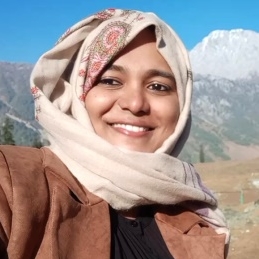
Dr Fousiya A A
Assistant Professor Grade I (Earth, Environmental and Sustainability Sciences)
+91 (0)471 - 2778385
fousiya@iisertvm.ac.in
Growing up on Minicoy Island in the Lakshadweep Archipelago, I was deeply connected to the vibrant marine ecosystems. However, witnessing the adverse effects of climate change on these ecosystems during my undergraduate years ignited my passion for environmental science. During my PhD at Anna University, Chennai, in collaboration with the Indian Institute of Tropical Meteorology (IITM) Pune, I applied geochemical and isotope tracers to study the impact of climate variability on marine carbonates, focusing on extreme events and ocean-atmosphere dynamics. I reconstructed key climatic events, such as thermal stress, monsoon variability, and the effects of El Niño, through stable isotopic analysis of coral and clam shell records. Additionally, I explored isotopic precipitation records to gain insights into key monsoon processes over southern India.
I joined the National Centre for Sustainable Coastal Management, Ministry of Environment, Forest & Climate Change, Govt. of India, (2019) as Project Scientist, conducted extensive fieldwork to Lakshadweep Islands as a part of Integrated Island Management Plan. My postdoctoral research at the Indian Institute of Technology (IIT) Kanpur, 2022 further enhanced my expertise in paleoclimate reconstruction, using radiocarbon dating and isotopic geochemistry to study late Holocene climate variability in the Lakshadweep region.
Since November 2024, I have been serving as an Assistant Professor at the School of Earth, Environmental, and Sustainability Sciences at the Indian Institute of Science Education and Research (IISER) Thiruvananthapuram. As a certified diver and advocate for women in science, I take pride in being the first woman from Lakshadweep to earn a PhD and complete postdoctoral research in Marine Geosciences.
My work is dedicated to advancing climate science and fostering public engagement, with a focus on enhancing the health of marine ecosystems. I strive to bridge the gap between scientific knowledge, policymakers, and communities, particularly in remote island regions, to address the urgent challenges of climate change and contribute to a resilient and sustainable future for vulnerable coastal ecosystems..
